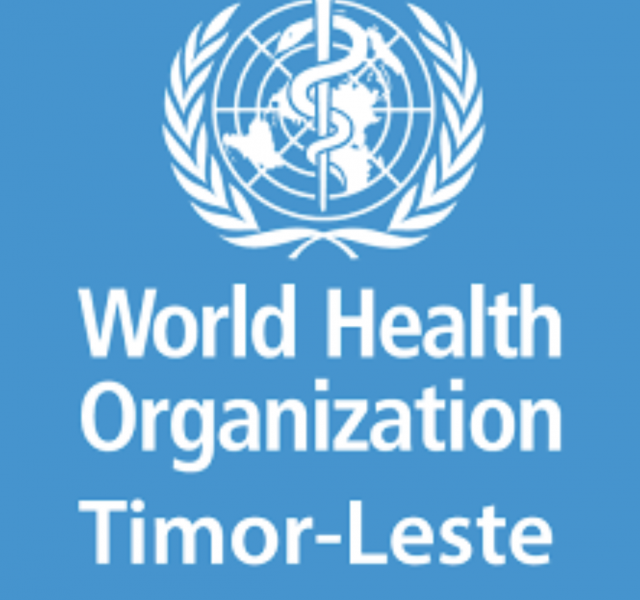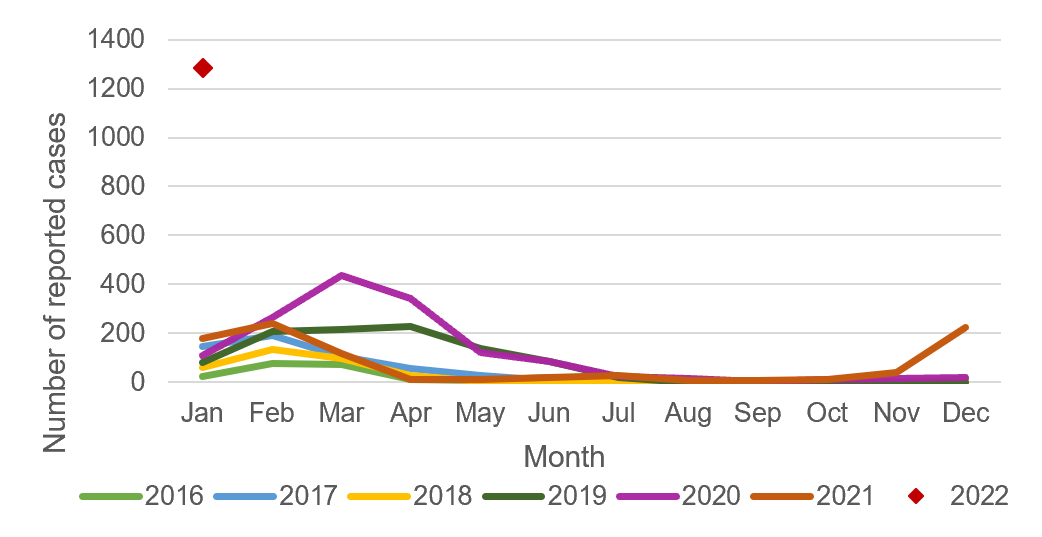
Dengue - Timor-Leste
February 17, 2022
South-East Asia Region
Timor-Leste
Timor-Leste
Timor-Leste has reported a surge of dengue cases since late 2021, at unusually high levels compared to previous years. There were 1451 reported cases and 10 deaths (CFR 0.7%) in 2020 and 901 cases and 11 deaths (CFR 1.2%) in 2021. In January 2022 alone 1286 cases were reported, of which 790 (61.4%) were children under the age of 14 years, 142 were severe dengue cases and 20 fatalities were reported (case fatality ratio 1.6%). The majority of the cases who presented to the hospital were diagnosed based on the clinical signs and symptoms. Dili municipality, which includes the capital city of Timor-Leste, reported the highest number of cases (857 cases 66.6%), followed by Manatuto municipality (92, 7.2%).
Dengue is endemic in Timor-Leste year-round, with peak transmission reported from December to April during the hottest months of the year (Figure 1). The ongoing monsoon season may increase mosquito density and the likelihood of further transmission of dengue in the next few months. In previous outbreaks between 2005 and 2012, two co-circulating serotypes, dengue virus 1 (DENV-1) and dengue virus 3 (DENV-3), were reported. Information on circulating serotypes has not been available since 2012.
Figure 1. Dengue cases reported in Timor-Leste, 1 January 2016 - 31 January 2022
Source: WHO Country Office in Timor-Leste, WHO Regional Office for South-East Asia
Public health response
The Ministry of Health has undertaken several response activities including:
- Strengthening clinical management as the top priority. WHO supported the government to train health care workers in clinical management. A series of additional clinical management trainings will be conducted.
- Drafting the national dengue control guidelines with support from WHO, which includes the clinical management algorithm.
- Conducting a nationwide information, education and communication campaign to disseminate information about prevention and home care for dengue.
- WHO supported 60 public health inspectors to conduct vector control and source reduction activities in the community, including distributing larvicides, fumigating malathion (mosquito adulticide) in residential quarters and mobilizing communities and volunteers to clean up water containers and the environment.
WHO risk assessment
Dengue is a mosquito-borne viral infection that is caused by four DENV serotypes (DENV 1, DENV 2, DENV 3 and DENV 4). Aedes aegypti and Aedes albopictus are widely adapted vectors for urban and peri-urban environments. Infection with one serotype provides long-term immunity to the homologous serotype but not to the other serotypes. Sequential infections put people at greater risk for severe dengue.
Although dengue in Timor-Leste is not unexpected, the significant daily increase in the number of dengue cases and the rate of hospitalization in the current outbreak are unusual. The number of reported cases between 1 December 2021 to 31 January 2022 is substantially higher compared to the same periods in previous years since 2016. As dengue is endemic in Timor-Leste, the population may be at risk of secondary infection and possible serious complications if not treated promptly and adequately.
There is no specific treatment for dengue. Early recognition of dengue virus infection and appropriate clinical management can reduce the severity of disease and mortality among dengue cases. Given the limited health care capacity in-country, poor access to health care, and COVID-19 and other diseases pressuring health capacity, there is a high risk of serious health impacts and an increased number of severe and fatal dengue cases. Co-infections with SARS-CoV-2 and DENV can also be expected.
